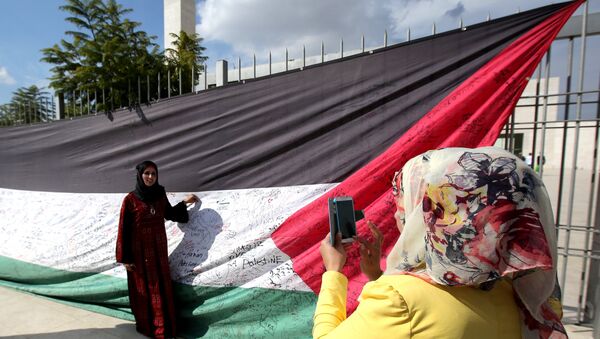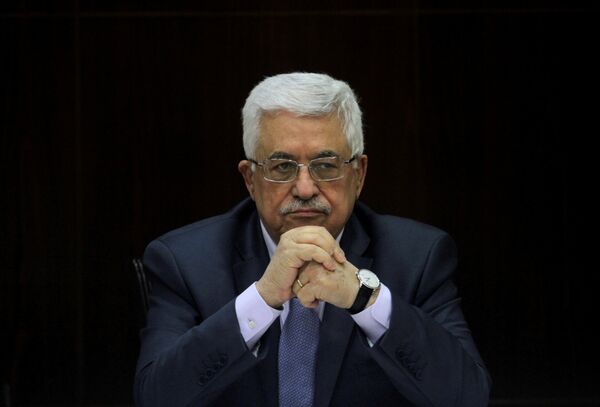While Palestinian leaders announced an agreement on 31 October to hold legislative and presidential elections within a year, doubts remain as to whether elections are possible, primarily because they do not currently appear to be in Israel's interests.
"Palestinians are going through a crisis. Given the fact that all Palestinian factions failed to offer people a way out of the mess, elections are important, specifically for the younger generation, as it gives them hope," said Nour Odeh, a political analyst from Ramallah and a former spokesperson for the Palestinian government, referring to the announcement of Dr. Hanna Nasser, the head of Palestinian Elections Committee, who received an agreement from all Palestinian factions - including Hamas and Islamic Jihad - to hold elections in the West Bank and Gaza.
The breakthrough was achieved after Nasser's delegation arrived in Gaza on Sunday to hold talks with the various factions and NGO officials in the Gaza Strip.
According to the agreement, legislative elections will be held first, with presidential elections following suit three to four months later.
How the Last Successful Elections Were Held
The last time presidential elections were held in the Palestinian Authority was in 2005. Back then Mahmoud Abbas came first, receiving some 62 per cent of all votes, while an independent candidate Mustafa Barghouti came second, getting the support of 19 per cent of voters. Hamas and Islamic Jihad boycotted the elections but didn’t disrupt them. As a result, only half of the eligible voters in Gaza, where Hamas was strongest, exercised the right to vote.
A year later in 2006, Palestinians held legislative elections, where Hamas won a sweeping victory. That subsequently led to the violent takeover of the Gaza Strip by Hamas, the ouster of Fatah officials and the division of the Palestinian territories into two entities: the West Bank and the Gaza Strip. That wound of division never seemed to heal, with reconciliation talks between the two main factions making little progress despite efforts of mediation.
Palestinians' Dissatisfaction With Leadership
This time round the prospects of elections appear brighter with Hamas giving its basic agreement to take part. But Odeh says President Mahmoud Abbas has been forced into a corner, with the Palestinian public demanding a change.
"Right now the public doesn't trust any of the factions, thinking they (all) failed them," she said in a phone interview.
Recent polls suggest that the Palestinians are disappointed with their leadership. A survey conducted in September by the Palestinian Center for Policy and Survey Research showed that more than 60 per cent of those asked demanded the resignation of President Abbas, with only 35 per cent wanting to see him stay in office. The survey also revealed that had the elections taken place immediately, Abbas' Fatah party would only get 38 per cent of votes, with Hamas getting 29 per cent.
Given these statistics, Odeh is not sure that holding elections will be beneficial to either Fatah or Hamas. "Past elections produced a majority of Hamas in the West Bank and another round might produce the same results. Alternatively, we might not even have a clear winner," she stated.
Fatah and Hamas Want Elections
President Abbas seems to be determined to proceed. Not only because he vowed to hold elections from the stage of UN's General Assembly back in September and not only because of the mounting dissatisfaction with the situation in the West Bank, but also because of pressure from neighbouring states.
In the south, there is Egypt that doesn't see eye-to-eye with Hamas. Cairo sees Hamas as a branch of the Muslim Brotherhood movement, which is considered a terrorist organization in Egypt. Elections in the Palestinian territories, Egyptians hope, might end their rule. In the north, the Lebanese anti-corruption protests risk spilling over to the West Bank and Gaza. According to a poll by the Palestinian Center for Policy and Survey Research, 80 per cent of Palestinians believe that the Palestinian Authority's institutions are corrupt with 64 per cent saying the same about Hamas controlled institutions. That's why, in order to prevent a wave of protests from spilling over to the West Bank and Gaza, the Palestinian leadership needs to show that it is serious about elections.
Possible Obstacles to New Elections
But Odeh says it is too early to talk about elections, primarily because there are plenty of problems that need to be solved before Palestinians go to the polls.
"First of all, there is an issue of whether Israel will permit these elections to take place," she said adding that in the previous round Israel interfered in the campaign. This included measures such as a blockade of the Palestinian territories, the prevention of candidates from moving freely and even arrests of some of them.
"Secondly, there is the issue of Jerusalem. In the past Arab residents of Jerusalem participated in the elections because of the pressure that the Bush administration put on the Israeli government. Now, however, the situation is different simply because US President Donald Trump recognized Jerusalem as the capital of Israel, making it impossible for the Palestinians to hold elections there," she said, stressing that if the Palestinian leadership gives up on holding elections in Jerusalem, it will be considered as a betrayal of the Palestinian cause.
Yet, Odeh is certain that whenever elections take place – if at all – they will be democratic. "We have a good tradition of democracy. Despite the fact that these elections brought Hamas into power, we as a nation showed the ability to elect our own government. This time around, when and if elections take place we will do the same and I am sure they will be transparent. The voice of the people will be heard," she concluded.





